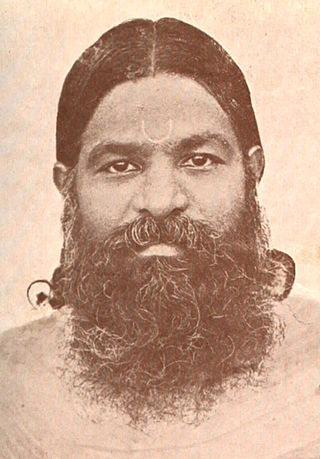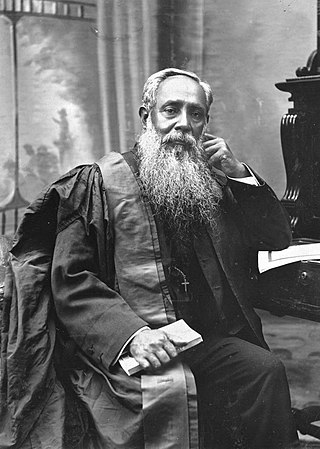The topic of this article may not meet Wikipedia's general notability guideline .(April 2018) |
S. M. Michael was one of the early 20th-century translators of the Tirukkural into English.
The topic of this article may not meet Wikipedia's general notability guideline .(April 2018) |
S. M. Michael was one of the early 20th-century translators of the Tirukkural into English.
S. M. Michael, a native of Nagarcoil, Tamil Nadu, was a pious devotee of the Kural text. He started translating the ancient literature into English in the pre-Independence Era. He established a publishing house named 'The Grace Hut' in the early forties in Nagarcoil. In 1946, he revised his translation and published it for the first time, under the title The Sacred Aphorisms of Thiruvalluvar. It was the fifth of the series published by the publishing house. These works were funded by several patrons, including the Government of Travancore, Dewan C. P. Ramaswami Iyer, and 40 others, whom he acknowledged in the preliminary pages of his translation. [1]
The Kural is the crowning glory of Tamil culture; to it more than to anything else is due the esteem in which the Tamilian is held throughout this globe; it is the most valuable and cherished possession of our race.
If the Englishman (John Bill) would sooner give up his Empire... than Shakespeare, we Tamilians, may boast similarly that we would rather lose all the other mighty monuments of our civilization like our temples and palaces and even the sources of our existence, the Cauvery and the Thamprabharni, than the Tirukkural.
It is, above all, the one boon in the world that would form the basis of a Universal religion such as many of us want today, and such as he seems to have envisaged so long as 2000 years ago and not only envisaged but also actually provided for; it is obvious that he wrote this book with this end in view. (Preface, pp. III–IV) [1]
In 1968, the work was published again by his son M. S. Raja in Sattur. [1]

Varahaneri Venkatesa Subramaniam Aiyar, also known as V. V. S. Aiyar, was an Indian revolutionary from Tamil Nadu who fought against British colonial rule in India. His contemporaries include Subramanya Bharathi and V.O. Chidambaram Pillai, who subscribed to militant forms of resistance against the British colonial government. He also exchanged ideas with V. D. Savarkar during his stay at India House in London. He went into exile in Pondicherry, then under French rule, when his militant activities attracted a warrant for his arrest from the British colonial government.
Kasturi Srinivasan was an Indian journalist and businessman. He was the eldest son of S. Kasturi Ranga Iyengar.

Kodaganallur Ramaswami Srinivasa Iyengar (1908–1999), popularly known as K. R. Srinivasa Iyengar, was an Indian writer in English, former vice-chancellor of Andhra University. He was given the prestigious Sahitya Akademi Fellowship in 1985.

Munnirpallam Sivasubramaniam Purnalingam Pillai was a Tamil language-writer and Dravidologist.
The Tirukkural, shortly known as the Kural, is a classic Tamil sangam treatise on the art of living. Consisting of 133 chapters with 1330 couplets or kurals, it deals with the everyday virtues of an individual. Authored by Valluvar between the first century BCE and 5th century CE, it is considered one of the greatest works ever written on ethics and morality and is praised for its universality and non-denominational nature.
Tirukkural, also known as the Kural, an ancient Indian treatise on the ethics and morality of the commoner, is one of the most widely translated non-religious works in the world. Authored by the ancient Tamil poet-philosopher Thiruvalluvar, it has been translated into at least 42 world languages, with about 57 different renderings in the English language alone.
William Henry Drew was a 19th-century Christian missionary to India who rendered the Tirukkural into English. However, he translated only the first 630 couplets of the Tirukkural.

John Lazarus (1845–1925) was a Christian missionary to India who rendered the Tirukkural into English. He revised the work of his predecessor William Henry Drew, who had already translated the first 63 chapters of the Tirukkural, and translated the remaining portion of the Kural text.

Tirukkural remains one of the most widely translated non-religious works in the world. As of 2014, there were at least 57 versions available in the English language alone. English, thus, continues to remain the language with most number of translations available of the Kural text.

Edward Jewitt Robinson was a 19th-century Protestant missionary to British India. He is best known as one of the earliest translators of the Tirukkural into English.
Herbert Arthur Popley was a Christian missionary of London Mission, Erode, known for his literary work as a translator of the Tirukkural and his skill in rendering Tamil Christian music in the Carnatic style. He was secretary of the All-India Y.M.C.A. At the time of his death, he was president of the local Y.M.C.A. and a director of the Coonoor Co-operative Urban Bank Ltd. He died in Coonoor on 9 May 1960 at the age of 81.
S. N. Sriramadesikan was an Indian scholar of Sanskrit and Tamil, lecturer, principal, editor and publisher. Among his many works, he is best known for translating the Tirukkural into both Sanskrit and English.
Charles Edward Gover (1835–1872) was a British folklorist in Madras, India. He was one of the earliest translators of the Tirukkural into English.
A. Chakravarti, who served the Indian Educational Service (IES), was a professor of philosophy at the Presidency College in Chennai, India. He is known for translating the Tirukkural into English.
G. Vanmikanathan, better known as G. V. Pillai, was a Tamil scholar, author, founder and organiser of the 'Tirukkural Prachar Sangh'. He is known for translating the Tirukkural into English.
P. S. Sundaram (1910–1998), born Pazmarneri Subrahmanya Sundaram, was an Indian professor of English, best known for translating the Tirukkural and various Tamil classics into English. He had degrees in English from the University of Madras and the Oxford University. He served as professor of English for about 40 years in different parts of North India.
S. M. Diaz was the Inspector-General of Police of Tamil Nadu. He was also a professor of economics and the first director of the Sardar Vallabhbhai Patel National Police Academy that trains officers who are inducted into the Indian Police Service. He is known for translating the Tirukkural into English.
Emmons E. White (1891–1982) was a Christian missionary in South India. He is best known for his work on Tamil music and his English translation of the Tirukkural.
Soibam Rebika Devi is an Indian translator who is best known for translating the Tirukkural into Meitei.
The Book of Inbam, in full Iṉbattuppāl, or in a more sanskritized term Kāmattuppāl, also known as the Book of Love, the Third Book or Book Three in translated versions, is the third of the three books or parts of the Kural literature, authored by the ancient Indian philosopher Valluvar. Written in High Tamil distich form, it has 25 chapters each containing 10 kurals or couplets, making a total of 250 couplets all dealing with human love. The term inbam or kamam, which means 'pleasure', correlates with the third of the four ancient Indian values of dharma, artha, kama and moksha. However, unlike Kamasutra, which deals with different methods of lovemaking, the Book of Inbam expounds the virtues and emotions involved in conjugal love between a man and a woman, or virtues of an individual within the walls of intimacy, keeping aṟam or dharma as the base.